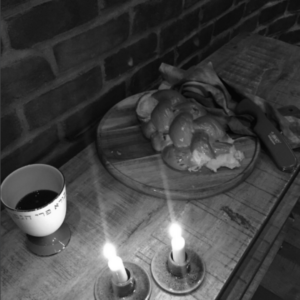Introduction
Published in February, 2021, this report explores insights and potential opportunities for OneTable, the Jewish young adult sector, and well beyond.
Prior to the Coronavirus pandemic, OneTable’s primary strategy was to bring people together — in person. We required a minimum of five people at Shabbat dinners and incentivized gatherings among people who shared interests but did not yet know each other. We saw Shabbat as an antidote to loneliness and worked to form ties and a sense of belonging among participants. In mid-March 2020, we recognized that many young adults were quarantining alone, some perhaps immunocompromised, and we wanted to ensure that they could still access resources and a sense of community so we lowered the minimum number of Shabbat participants to one.
Initially, we anticipated that people would choose solo dinners as a last resort. We were wrong. These young adults sought out alone time, and reported feeling relaxed, comforted, and connected after their solo dinners.
Highlights
I’m experiencing such Zoom fatigue, that virtual Shabbats take more energy. Solo Shabbats bring more peace. Aside from times when friends reach out to plan, I enjoy having Fridays for me and knowing it’s ahead.
– OneTable participant

Research Findings
OneTable participants embraced solo Shabbat dinners during the pandemic. Pre-COVID, all OneTable dinners were in person, averaging 10-12 people each. At the time of this publication, February 2021, OneTable offered five distinct ways to utilize its Shabbat dinner platform: solo dinners, events for people who live together, virtual gatherings, outdoor, socially distant dinners, and joining a OneTable Live gathering via Instagram or Zoom hosted by OneTable and its partners.
As a result of these increased options, young adults posted 95% more dinners than the previous year (15,000 dinners between March – December 2020; vs. 7,700 during the same period in 2019).
We found that OneTable participants were creating Solo Shabbat dinners for themselves because they wanted to do something to separate the week from the weekend, they needed a moment of peace for themselves, and they wanted to do something Jewish.
Initially, we anticipated that people would choose solo dinners as a last resort. We were wrong. These young adults sought out alone time, and reported feeling relaxed, comforted, and connected after their solo dinners.
Repeatedly, we heard a theme of being alone, but not lonely.
I used to think of Shabbat as religious, serious, and concrete. But quarantine has helped me go through a lot of personal growth and this is another tradition that I can just have for myself. Regardless of what is happening with other people: friends, coworkers, external factors, I know I have this night of the week for me no matter what the world looks like.
– OneTable participant

Background + Methodology
Between March and August 2020, 148 individuals posted at least one Solo Shabbat dinner through the OneTable platform. On September 4, 2020, we issued a 13-question free-response survey to learn more about their experience and to recruit participants for focus groups; 66 participants responded (45% response rate).
In October we conducted two focus groups; each with five OneTable Solo Shabbat participants, from diverse geographic areas: New York City, Chicago, Denver, Washington, D.C., Madison, WI and Newcastle, WA. Two participants identified as male, eight identified as female. Eight were a guest at a OneTable dinner before posting their Solo Shabbat. Three applied to host with OneTable during the pandemic.

